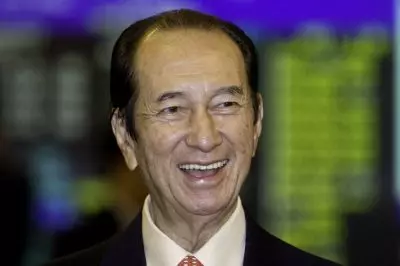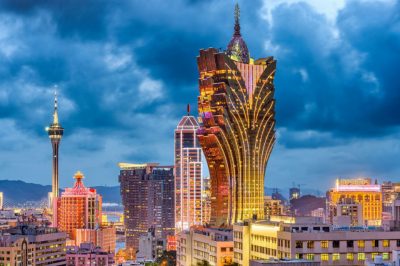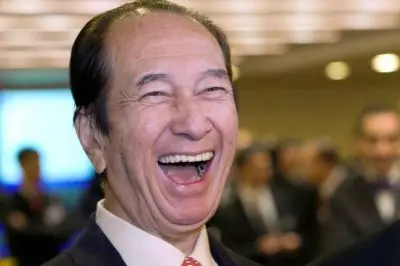 One of the most famous casino tycoons in the world, Stanley Ho, passed away earlier today in Hong Kong, as confirmed by his family. Mr. Ho, who led the transformation of Macau into a lucrative gambling hub, was 98 years old.
One of the most famous casino tycoons in the world, Stanley Ho, passed away earlier today in Hong Kong, as confirmed by his family. Mr. Ho, who led the transformation of Macau into a lucrative gambling hub, was 98 years old.
The death of the “Macau gambling king”, as Mr. Ho has often been called, puts the end of an era in the local casino and gambling sector.
As controversial as Stanley Ho’s figure has been throughout the years, the tycoon has managed to amass a family fortune that was estimated by Bloomberg at over $12 billion in 2017. His gambling empire involved the ownership and operation of 20 casinos and related businesses, with them holding about 25% of the overall labor force in Macau. Furthermore, Mr. Ho’s business accounted for more than 70% of the tax revenue generated in the Asian gambling hub.
Apart from some public criticism over his alleged connections with some criminal organizations, the final years of Mr. Ho’s life were marked by some personal difficulties, too, as many of his 14 surviving children tried to claim stakes in his gambling empire. At the beginning of 2011, at the time when the Chinese gambling tycoon was recovering from brain surgery, this second and third wives tried to take control of his business, with his lawyer confirming that the relatives of Mr. Ho had tried to trick him into signing over his remaining shares in the enterprises.
The advancing age and deteriorating health of Mr. Ho eased his family factions’ strive for getting the majority part of the assets in the Chinese mogul’s empire. Back in March 2011, all branches of the family issued a statement, saying they had made an agreement to work together and devote themselves to the development of the gambling business established by Mr. Ho.
Two years ago, in June 2018, Mr. Ho’s daughter Daisy took the position of STDM’s flagship gambling arm – SJM Holdings – after her father retired at the age of 96. Previously, another daughter of his, Pansy Ho, received the control of Shun Tak Holdings. His son, Lawrence Ho, become CEO of the Macau casino joint venture between his father and Crown Limited, called Melco Crown Entertainment.
Infallible Business Instinct Helps Stanley Ho Transform Macau into World-Known Gambling Hub
 Born on November 25th, 1921, into a wealthy Hong Kong family whose fortune was lost during the global depression, Stanley Ho proved that he had resourceful and resilient enough to start his businesses literally from scratch and become one of the most powerful tycoons in the gambling industry.
Born on November 25th, 1921, into a wealthy Hong Kong family whose fortune was lost during the global depression, Stanley Ho proved that he had resourceful and resilient enough to start his businesses literally from scratch and become one of the most powerful tycoons in the gambling industry.
After establishing and operating a construction company that brought him success after World War II, Mr. Ho started making his first steps in the gambling sector in the early 1960s. At the time, he formed part of an investor group that was granted the exclusive rights to operate a casino on the territory of Macau after making a pledge to the Portuguese colonial authorities that it would try to popularize tourism in order to help the region improve its infrastructure. The monopoly was named Sociedade de Turismo e Diversões de Macau (STDM) in 1961, and its flagship property, the Lisboa Casino Hotel, soon gaining popularity on a global scale.
The fortunes piled by the STDM rose immensely in the 1980s when mainland China saw a newly-emerged capitalist class showing its eagerness to spend its wealth in the casinos owned by Mr. Ho. It was at the time when he developed a strategy of subcontracting special gambling rooms for high-roller players and sharing the revenues with the subcontractors, whose task was to attract wealthy Asian players to Macau.
However, the hotel and casino business of Mr. Ho started to draw criticism as these enterprises were rumored to have been attracting members of criminal organizations, with various gambling analysts and law enforcement officials alleging that the Chinese tycoon’s casinos, especially the high-roller rooms, were used by such organizations for money-laundering.
Stanley Ho’s Macau Casino Business Associated with Criminal Organizations and Money Laundering
 In fact, Mr. Ho did not deny the allegations of connections with some Chinese triads at the time when he made a written statement for The New York Times in 2007. On the contrary he confirmed that anyone involved in gambling operations in the 1980s and 1990s was vulnerable to such accusations.
In fact, Mr. Ho did not deny the allegations of connections with some Chinese triads at the time when he made a written statement for The New York Times in 2007. On the contrary he confirmed that anyone involved in gambling operations in the 1980s and 1990s was vulnerable to such accusations.
With the end of the colonial rule of Portugal over Macau, the struggle for supremacy between local criminal organizations has put Mr. Ho’s gambling empire at risk, along with the ability of Macau to continue attracting tourists to the local casinos. It was the arrival of the security forces of mainland China’s Government that brought the violence between the triads to an end.
A few years later, the authorities in mainland China decided to open Macau to competition to bring there international casino operators, with the step ending the gambling monopoly that Mr. Ho held in the region. After the opening of Macau to foreign gambling companies, some massive gambling complexed held by US behemoths Sheldon G. Adelson and Steve Wynn were established.
The competition, however, has not frightened Stanley Ho. On the contrary, it even pushed him to consider modernization of his gambling operations in Macau and investing in the establishment of new luxury casino hotels. The profits of his gambling empire continued to rise, with Macau becoming the largest gambling destination on a global scale, surpassing iconic Las Vegas by 2006.